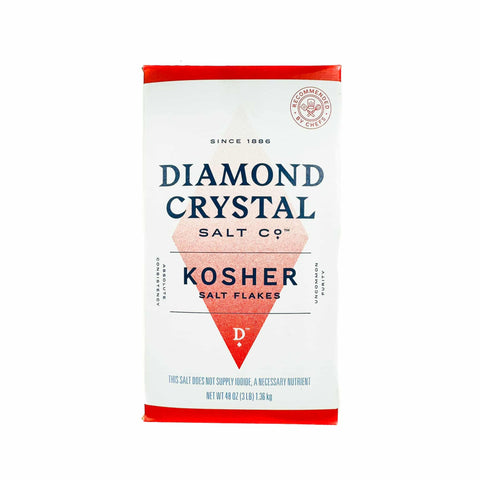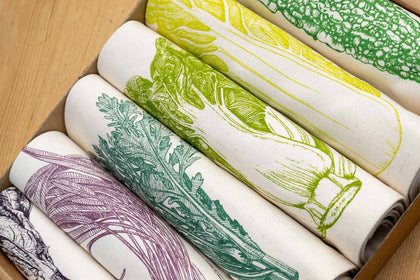The Ultimate Guide to Kosher Salt
by Holly Thomson

You may have read about kosher salt, and seen it used in recipes – but what is it, and how does it differ from other cooking salts? Here we explain what makes Kosher salt so popular, and the best ways to use it in the kitchen.
If you're looking to buy the number 1 kosher salt brand, Diamond Crystal Kosher Salt, find it here. Or browse other speciality salt brands.
What is kosher salt?
Kosher salt is loved by chefs for its fine crystals and delicate taste.
It is popular in America but unlike many American salts, it is made with no added iodine, unlike iodized salt, which is important for thyroid and hormone health. This gives kosher salt a softer flavour than traditional American table salt.
In the UK, it is not compulsory to fortify salt with iodine, so we may not notice such a dramatic difference in flavour.
However, kosher salt grains sit in between fine table salt, which pours smoothly from a shaker, and large sea salt flakes. Compared to sea salt, it is much easier to rub kosher salt between your fingers and sprinkle over a dish.
Characteristics of Kosher Salt
Kosher salt stands out in the culinary world due to its distinctive characteristics. Unlike table salt, which has a fine grain, kosher salt boasts a coarse texture that makes it easier to sprinkle and distribute evenly over food. This coarse texture is particularly appreciated by chefs who need to control the amount of salt they use with precision.
One of the most notable features of kosher salt is its larger grain size. These larger grains allow for more precise salting during food preparation, cooking, and serving. Whether you’re seasoning a steak or adding a finishing touch to a salad, the larger grains of kosher salt give you better control over the saltiness of your dish.
Kosher salt is composed of pure sodium chloride, without any additives or anti-clumping agents. This purity ensures that the salt dissolves quickly and evenly, enhancing the flavor of your food without any unwanted aftertaste. Additionally, kosher salt is not iodized, making it a suitable choice for those who prefer to avoid iodine in their diet.
Kosher salt in the UK
You can find kosher salt in the UK in most supermarkets.
Look for the Diamond Crystal brand. Kosher salt is often labeled as 'coarse salt' or 'rock salt' in UK supermarkets.
Buy Diamond Crystal Kosher Salt here!
Where does kosher salt come from?
Whereas the majority of salts are made by evaporation of seawater, Kosher Salt is sourced from land salt mines.
Water is injected into the mine to make a brine, which is then removed and slowly heated, dried and agitated to produce kosher salt.
How is kosher salt with coarse texture different to table salt or sea salt?
As a result of the slow heating and agitation during the production process, the final salt crystals are hollow, coarse and more irregular in size when compared to normal table salt and sea salt.
It’s hollow shape also means it dissolves quicker on your tongue, giving it a softer flavour compared to sea salt.
Both salts, however, are made up of the same sodium chloride particles and have no additives.
Sea salt can be considered purer as it has a simpler production process of evaporation, but with the increase of microplastics and pollutants in the sea more people believe kosher salt to be a purer form of sodium chloride.
The main difference between table salt and kosher salt in the UK is the grain size. Due to the larger grain size when measuring salt by volume kosher salt has 53% less sodium than table salt per teaspoon. Kosher salts are preferred by many due to their purity and larger grain size.
How do you use kosher salt?
-
Seasoning a finished dish. The crystal size makes it easier to control kosher salt’s intensity – because a pinch of Kosher salt is less powerful than a pinch of standard fine-ground table salt.
-
Seasoning as you cook. Once you get the hang of the ‘saltiness’ and feel of kosher salt, you’ll want to season all your dishes with it – naturally reaching for just the right amount as you season pasta water, sauces and stir fries.
-
Salting and drying food. Kosher salt is very popular for salting food, as it doesn’t contain anti-caking agents so the flakes stick to food easily.
-
Fermenting food. Since kosher salt doesn’t have any iodine or additives, unlike table salt, it won’t slow down or inhibit the bacteria during the fermenting process. It also dissolves much easier when making a brine.
-
Flavoured salt mixes. The texture of kosher salt makes it a good choice for combining with finely chopped herbs, citrus peel, chilli flakes or dried garlic for homemade flavoured salt. Serve your salt mix alongside good olive oil for dipping bread.
Health and Nutrition
Kosher salt is not just a kitchen staple; it’s also a valuable source of sodium, an essential nutrient for the body. Comprising 99.5% sodium chloride, kosher salt provides the sodium necessary for various bodily functions, including nerve function, muscle contraction, and maintaining proper hydration levels.
Despite its essential role in the diet, kosher salt is very low in calories, with only 0.2 calories per gram. This makes it an excellent choice for those who are mindful of their caloric intake but still want to enhance the flavor of their meals.
Another significant advantage of kosher salt is its lack of additives. Unlike some table salts that contain anti-clumping agents and other additives, kosher salt is free from these substances. This purity makes it a preferred option for those looking to avoid processed foods and maintain a cleaner diet.
Why is it called kosher salt?
The name kosher salt refers to the Jewish tradition of ‘koshering' meat, by drawing blood using salts.
Kosher butchers chose this salt with slightly larger flakes, and so it became universally known as ‘Kosher salt'.
There are actually two types of kosher salt, kosher-style salt and kosher-certified salt. For a salt to be certified as kosher it has to be reviewed by a Jewish institute.
Storage and Shelf Life
Kosher salt is a durable and long-lasting product, making it a convenient addition to any kitchen pantry. To ensure that your kosher salt retains its flavor and texture, store it in a cool, dry place, away from direct sunlight and moisture. This will help prevent the salt from clumping and maintain its quality over time.
For optimal freshness, keep your kosher salt in an airtight container. This will protect it from absorbing moisture from the air, which can affect its texture and usability. When stored properly, kosher salt can last for up to 5 years without losing its flavor or texture.
However, for the best flavor and texture, it’s recommended to use kosher salt within 2 years of opening. This ensures that you get the most out of your salt, whether you’re using it for cooking, seasoning, or preserving food.
By following these storage tips, you can make the most of your kosher salt and enjoy its unique characteristics in your culinary creations.
Which kosher salt should I buy?
Diamond Crystal kosher salt is one of the most recommended kosher salts due to its fine, almost crumbly texture – with no additives.
It is referenced throughout The French Laundry cookbook, where Thomas Keller explains: “we use a specific brand of kosher salt, Diamond Crystal, because of the size of the grains. Salt is the primary seasoning ingredient we use.
It heightens the flavour of everything across the board…without it, the flavour of meats and vegetables and fruit is a little flat, dead, fade, as they say in France – insipid. Salt opens up flavours, makes them sparkle.”
Maldon Sea Salt has been offered kosher-certification but it is still different in grain size and shape to kosher-style salt.
The soft flaky texture of Maldon sea salt crystals and the cleanness of the salt flavour they deliver makes this salt stand out.
Maldon sea salt is a beautiful finishing salt - great sprinkled over lamb, fresh asparagus and gougères. Or try Maldon sea salt in sea salt chocolate truffles or a salted caramel sauce.
Browse our salt & pepper collection for more seasoning inspiration. Or take a look at our salt buying guide to learn more about other world salts.




